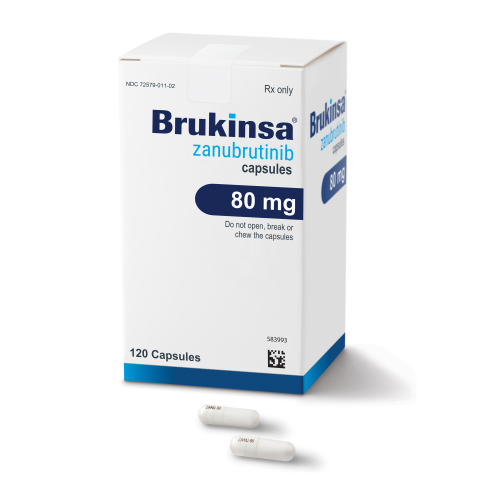CAMBRIDGE, Mass. & BEIJING– BeiGene, Ltd. (NASDAQ: BGNE; HKEX: 06160), a global biotechnology company focused on developing and commercializing innovative medicines worldwide, today announced that BRUKINSA® (zanubrutinib) has received approval from the U.S. Food and Drug Administration (FDA) for the treatment of adult patients with Waldenström’s macroglobulinemia (WM).
“We are delighted by today’s FDA approval for BRUKINSA in its second indication, offering a new treatment option with demonstrated efficacy and safety benefits for patients with Waldenström’s macroglobulinemia. As shown in the ASPEN trial, BRUKINSA can improve treatment outcomes for these patients and potentially make a positive impact on their lives,” commented Jane Huang, M.D., Chief Medical Officer, Hematology at BeiGene.
Dr. Huang continued, “With 11 regulatory approvals in under two years, including two in the U.S., BRUKINSA is demonstrating its growing utility as a treatment option for B-cell malignancies and expanding its footprint to potentially benefit more patients worldwide. We will continue to evaluate BRUKINSA in its broad global clinical program and look forward to additional clinical evidence to establish its position as a potentially best-in-class medicine.”
“The ASPEN trial provided compelling evidence that BRUKINSA is a highly active BTK inhibitor in Waldenström’s macroglobulinemia, and compared to the first-generation BTK inhibitor, showed improved tolerability across a number of clinically important side effects. The approval of BRUKINSA provides an important new option for targeted therapy in Waldenström’s macroglobulinemia,” said Steven Treon, M.D., Ph.D., Director of the Bing Center for Waldenström’s Macroglobulinemia Research at the Dana-Farber Cancer Institute and Professor of Medicine at Harvard Medical School.
“The approval of BRUKINSA in Waldenström’s macroglobulinemia, which is the second therapy approved specifically for the treatment of this rare type of lymphoma, is positive news for patients. Expanded treatment options offer new hope for those living with this disease and can potentially improve patient experience, especially oral therapies that can be given as a single agent,” said Pete DeNardis, Chair of the Board at the International Waldenström’s Macroglobulinemia Foundation (IWMF).
The FDA’s approval of BRUKINSA in WM is primarily based on efficacy results from the multicenter, open-label Phase 3 ASPEN trial (NCT03053440) comparing BRUKINSA to ibrutinib in patients with WM. A total of 201 patients with a MYD88 mutation (MYD88MUT) were enrolled in the randomized Cohort 1.
The primary efficacy endpoint of the ASPEN trial was very good partial response (VGPR) rate in the overall intention-to-treat (ITT) population as assessed by independent review committee (IRC). Based on the modified Sixth International Workshop on Waldenström’s Macroglobulinemia (IWWM-6) response criteria (Treon 2015), the VGPR rate was 28% with BRUKINSA, compared to 19% with ibrutinib; based on the IWWM-6 response criteria (Owen et al 2013), the VGPR rate was 16% with BRUKINSA, compared to 7% with ibrutinib.
In the FDA-approved label, the major efficacy outcome is defined as response rate of partial response (PR) or better as assessed by IRC. Based on either IWWM-6 response criteria, the response rate was 78% with BRUKINSA (95% CI: 68, 85), compared to 78% with ibrutinib (95% CI: 68, 86), and the event-free duration of response (DoR) at 12 months was 94% with BRUKINSA (95% CI: 86, 98), compared to 88% with ibrutinib (95% CI: 77, 94).
The most common (≥20%) adverse reactions based on the pooled safety population of 779 patients were decreased neutrophil count, upper respiratory tract infection, decreased platelet count, rash, hemorrhage, musculoskeletal pain, decreased hemoglobin, bruising, diarrhea, pneumonia, and cough.
The recommended dose of BRUKINSA is either 160 mg twice daily or 320 mg once daily, taken orally with or without food. The dose may be adjusted for adverse reactions and reduced for patients with severe hepatic impairment and certain drug interactions.


